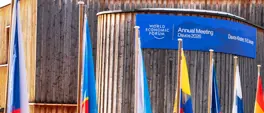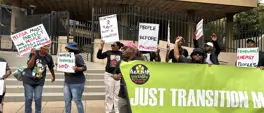Jamil F. Khan | American dreams, apartheid fantasies: The political theatre of white Afrikaner 'refugees'
Jamil F. Khan
27 May 2025 | 13:26The departure of 49 white Afrikaners from South Africa as refugees to the United States has sparked political debates and jokes alike, with a clever reference to their historical trek across South Africa dubbing them the “Voetsekkers”.
The United States of America has, for about a century, sold itself to the world as a utopia through its most reliable propaganda machine: Hollywood.
As a child, I could not wait to grow up and experience the wonder I witnessed on screen. I hoped to stay forever and live happily ever after. I know that I am not the only one who grew up with this fantasy, but I am now in the company of the few who see the USA for what it is, and has been, since its current form was founded by the genocidal, colonial powers of Europe.
The irony is that even while I was drinking the Kool-Aid of the American Dream, its reality for indigenous and Black Americans encountered fierce and enduring resistance that made of the United States the same violent place it is today.
Violence, of any nature, is a disturbing and terrifying reality of our world and one that has come into a special spotlight on account of the "white genocide" furore that has dominated our political arena in recent months.
The departure of 49 white Afrikaners from South Africa as refugees to the United States has sparked political debates and jokes alike, with a clever reference to their historical trek across South Africa dubbing them the "Voetsekkers".
Though our propensity for quick-witted humour in times of distress is commendable, these 49 Afrikaners and their treasonous performance of victimhood reveal a more important link between the society they mourn and leave behind, and the one they are embracing.
Like apartheid South Africa, the United States offers them a social reality that affirms their sense of identity. A society that is unapologetic about its disdain for Black people. While there are many places in the world, like Europe, where white supremacy still organises societies, its application has been modified to appear less flagrant.
Under the current Trump administration, this blatant disdain for Black lives and Black sociality offers a comforting reassurance to those Afrikaners that there are still places in the world where anti-Black racism does not try to conceal itself.
This tendency towards finding a more culturally-affirming society is not a new trend amongst white South Africans in general, and Afrikaners specifically. The well-known racism of Australian society, for example, has attracted hordes of our home-grown racists post-1994, where they have become notorious for their insufferable racism even amongst their hosts.
This latest migration is only unique in its framing as an asylum arrangement, but the sentiment of persecution and subsequently fleeing said persecution has always been central to the imagination of post-apartheid whiteness. It is a performance that has made engagement with many white people, of all ages, cumbersome and degrading in democratic South Africa.
It is fair to say that not all white people in South Africa feel this way and that some are making genuine efforts to co-exist and integrate, but it would be dishonest to claim that they comprise a majority. This reality therefore informs a bigger point about whiteness in South Africa, Afrikaner and otherwise.
While we might confuse our hopes for the future with our current reality, we cannot ignore the fact that the white supremacy that organised our society for the last 373 years through colonisation, slavery and apartheid has not evaporated into thin air.
Further, the white supremacy formulated and perfected here has an ongoing relationship with global white supremacy that has now come yet again to remind us that our lives are not worth the same as white lives.
While everybody in South Africa is besieged by the threat of violent crime, to the extent that our social sensibilities are dominated by a unique vigilance in all settings, it is only a special group of white people who are deemed worthy of saving.
This knowledge that whiteness is prioritised, exceptionalised and incentivised runs through white sensibilities across the world. Its threat to South African society is thus not isolated to the tantrums of 49 Afrikaners and their counterparts who have decided to stay, but remains connected to a global problem of anti-Blackness.
The historical connections between apartheid South Africa and the United States were brought up, embarrassingly, by Ernie Els in the White House during the recent diplomatic mission of our President and his chosen allies.
During the engagement, he thanked the United States government for their help during the South African border war in Angola. Though we can laugh at how "off-script" his comment was, it reveals the white South African imagination’s commitment to legitimising apartheid.
Thanking the United States for its help during a war against Black people shows where the relationship between whiteness here and in the United States finds expression. It is in a historical and current racism that still sees this land as a commodity to be fought for, which is the ideal the 49 Voetsekkers have abandoned and thereby betrayed.
This context is important in thinking through what this diplomatic tug-of-war means for our society. These displays of global solidarity between regional whiteness remind us that our struggles for transformation here are not only curtailed by an isolated local resistance that is contained within our borders. We are in a moment of widespread backlash against racial equality, that is unashamedly being led by the United States.
Though this intervention has been agitated for over many years by AfriForum and other white interest groups, it is being responded to now because the mask that has slowly obscured the true face of America through the decades of begrudged civil rights concessions, has been ripped off. The quiet part is being said out loud again.
As the United States stands proud as the headmaster of overseeing and implementing apartheid within its borders and abroad, it only stands to reason that those who have yearned for its return in South Africa heed the call to "Make America Great Again".
After all, that might be the only practiced skill they can truly offer to their gracious new hosts. We wish their new neighbours a saintly patience and nerves of steel.
Jamil F. Khan is an author, doctoral critical diversity scholar, and research fellow at the Johannesburg Institute for Advanced Study.
Get the whole picture 💡
Take a look at the topic timeline for all related articles.

















